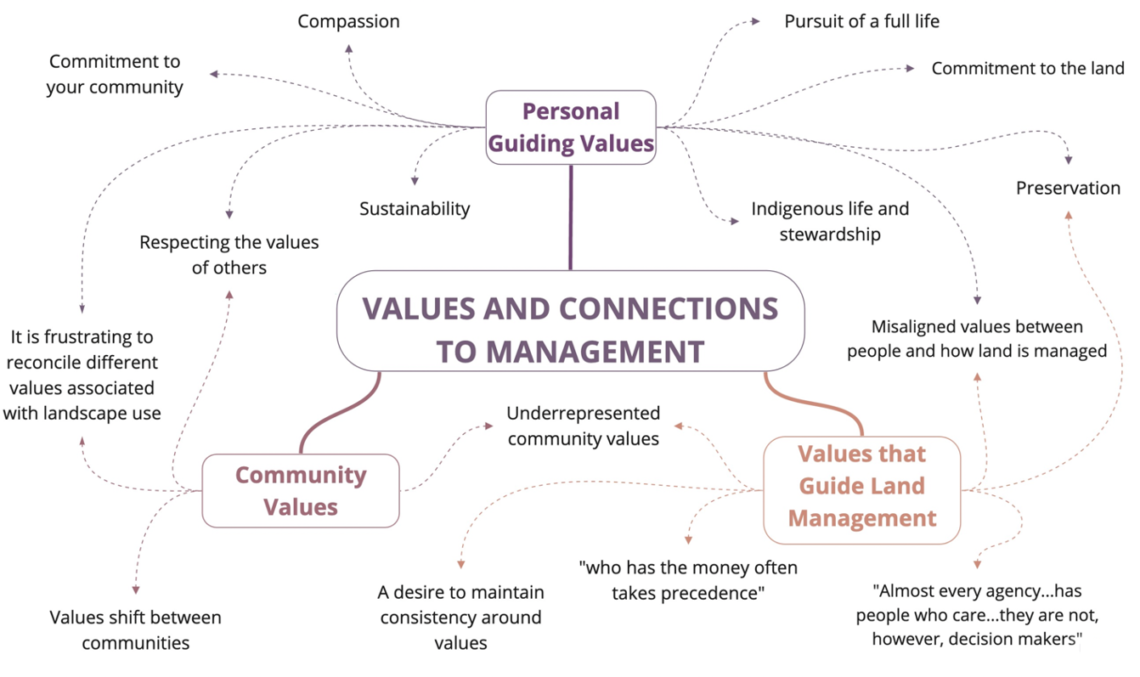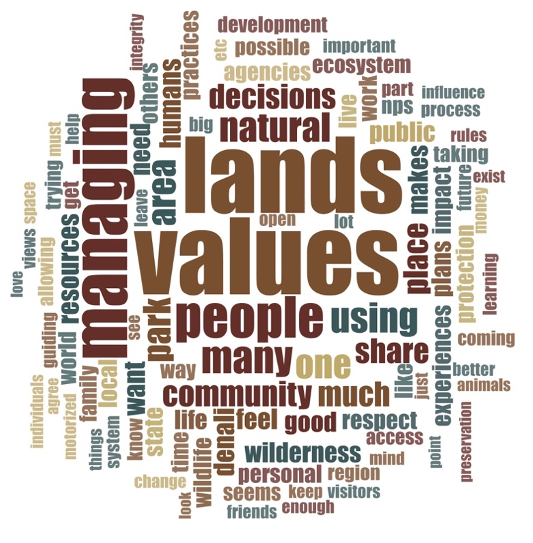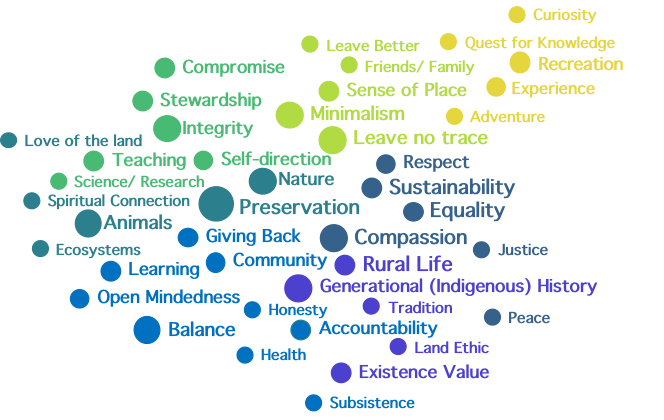
Week 3: The Role of Values in Management
Week 3 of the Denali Discussion Forum explored the values that guide your lives and influence preferences for public land management. You also discussed how your values were, or were not, shared by others in your community and land management agencies responsible for decision-making. We have appreciated your continued participation over the last three weeks and the respectful tone you have maintained, even when your perspectives have differed. In line with our observations from the first two weeks, there are many interesting points of agreement and differences highlighted that we have summarized in this sheet. Your feedback on this material would be welcomed either online or by email.
Week 3 Prompt: What are the values that guide your life and how do these values influence your views of public land management in the Denali region? Do other people in your community share your values? To what extent do land management agencies reflect your values in their decision-making?
We are interested in understanding the different pathways by which people’s values guide their preferences and behaviors surrounding protected area management. Our prompt this week reflects those interests, but was also driven by your conversations during the first two weeks of the Forum about reframing the way we think and talk about protected areas in the Denali region. We realize that the prompt this week was more introspective than the last two and appreciate how you accepted the challenge of articulating your complex value systems. You discussed different kinds of values and then utilized these values to characterize yourself, consider the values in your community, and evaluate the values of land management agencies (Figure 1).
Some common values discussed revolved around your different ways of connecting with the landscape, your community, and your desire to live a self-directed, self-fulfilled life. There was also a greater degree of differences across groups this week (potentially since groups were, in part, assigned by values measured from the survey). Group A emphasized balance between protection and use, as well as debated how existing rules versus social norms or an honor system may better support land management. Group B discussed sets of values that surround recreational activities and experiences in the Denali landscape. Group C’s discussion situated inclusiveness, equity, and also brought up the implications for valuing “wilderness” as an anthropocentric framing. If other community members or land management agencies shared your values remained open for debate, with some of you saying, “yes” and others, “no”, depending on what your particular set of values is.

What are values?
There are many ways to think about values and we learned a lot from your conversations. Some of you considered values as the ways you interacted with the landscape, such as a deep commitment to the land and living lightly. Others defined values by your core sets of virtues—e.g., integrity, equality, tradition, thirst for knowledge. In all, you identified over 60 values that were bundled and related to land management (Figure 2). Some of these conceptualizations of values were frequently mentioned close together (e.g., adventure and experience; or sustainability and preservation), while others were considered to be conflicting or in opposition (e.g., anthropocentrism versus viewing all life equally). One person reflected on how values may be passed down through generations:
“Values are the things that guide you as a person and make up your character. Values are taught to children and ingrained into the very way you think and do as you grow…. I believe we should all treat each other and the planet as respectfully as possible.”
You used values throughout the forum to anchor priorities, goals, and use, but also considered values as a way to assess public land management agencies. You considered how shared values may be embodied by actions, people, or agencies to improve decision-making. You also acknowledged how difficult this would be and that the concept of managing from an established “shared set of values” would be problematic for those at the margins who hold different values. This left open the question of how to use values in reframing public land management when considering people or groups whose values significantly differed from one another. There did seem to be a general sense that outlets like this discussion forum created a space to talk about values, and could be used to better align decision-making with the many values of residents in reframing public land management.
Values that Guide your Life
The values that guide your life included a commitment to the land, a commitment to others, and the desire to live a self-fulfilled life. For example, one resident shared their interconnected values to the land, their community, and lived experiences:
“The values that guide my life are freedom to push out and explore Alaska and enjoy outdoor life as much as possible, being a good neighbor by respecting others space, and keeping a respect for nature and the opportunities she provides by minimizing my footprint.”
Commitment to the land
Many of you felt like the landscape and ecosystems in Alaska deserve continual consideration throughout daily actions. The idea of having as little impact on the environment as possible resonated, as did the joy of doing so successfully, “I try to lead my life with as little impact as possible on the natural environment but with as much impact as possible on the people surrounding me.” Your desires to consider impacts on the landscape guided a variety of behaviors such as plastic use reduction, carpooling, and recycling. However, several noted that framing connections to the land in terms of preserving “untouched wilderness” could be problematic given the history of Indigenous people who have lived in the region for generations:
“We really, need to step away from using ‘untouched wilderness, free of human contact’ rhetoric, because it erases the history of Indigenous life and stewardship, and it’s just not true. Everything… every single thing we see and benefit from in Alaska is that way because Indigenous people took care of it.”
These differences were interesting because they demonstrated that people may hold similar core values, but that these values could manifest in different ways that direct how to live life. Additionally, you acknowledged that while many values were shared, respecting the different values of others—especially those at the margins—was an important consideration, especially if shared values were to be used as a management strategy.

Commitment to your community
You talked about values related to your position within your community and relationships, such as your responsibility to be a moral citizen and good neighbor. Common words used to describe your moral responsibility to others included, respect, integrity, conviction, honesty, justice, equality, kindness, thoughtfulness, understanding, and inclusion. You also expressed interest in having these values matched within land management, “I think my values of honesty and integrity lead me to want the decision-making structures, and the people in them, to be honest and have integrity as well.”
A desire to achieve equality, justice, and representation were a salient grouping of your values around ideals of equity. Unique concerns were discussed throughout the three groups, but many conversations on this topic revolved around ecosystem conservation and the underrepresentation of certain voices, especially for Indigenous Peoples. Many of you held yourself to high standards of integrity, respectfulness, and compassion as core values,
“Respect and equality for others. We need to be bringing up all people who have been pushed to the margins, whether that’s because of race, gender, religion, income level, physical or mental ability, etc. Our community, state, and country will thrive when we take care of everyone.”
As a result, there was an expectation that these values should be reflected in decision-making. In complement, you proposed management solutions to identify prominent values of the region: “In my mind a better answer would be for all local stakeholders to gather and identify the many values amongst them.” However, you also debated what a majority-based system would look like and if it would still leave out voices who are currently underrepresented in decision-making.
Pursuit of a self-directed and full life
In addition to wanting to give back to others and the place that you love, many of you valued the aspects of life that bring personal fulfillment and experience. For example, a resident shared their values to pursue a full life, focused on what really matters to them:
“Focusing on personal experience, travel, and people not on making money. When all is said and done, what one has from life are memories, experiences, friends, and family… I don’t believe anyone on their death bed ever lamented that they wished they’d spent more time at work than with friends, family, or in the pursuits they loved…”
The pursuit of personal experiences also came through in your quest for knowledge and love of learning. As some of you pointed out, the value of acquiring and sharing information amongst group members may not be surprising given the self-selection of participating in a discussion forum based on learning, including valuing “the qualities of working together, listening, sharing, and benefiting from [voices] as a whole.” A William Pollard quote was shared in one group that exemplified your value of learning to improve public land management: “Learning and innovation go hand in hand. The arrogance of success is to think that what you did yesterday will be sufficient for tomorrow.”
Shared Values in the Community
You shared a variety of perspectives about whether values were similar amongst group members in the Denali Discussion Forum, as well as people who lived in nearby communities. Some agreed that values were shared, while others saw more differences in their values. By asking to compare yourself to others we hoped to draw out the complexities in different kinds of values people may hold. From the responses, we saw a clear need to consider the range of values in the Denali region and how they could be better folded into public area management.
Are values shared outside of a discussion group?
Many suggested that your community generally held the same values as you. However, some of you emphasized the geography of values in the Denali region, and that values often shift dramatically between communities. As one of you said, “Healy is not Talkeetna.” Some of you even chose to live in specific areas based on the values that aligned with your own. One resident explained,
“Many people, but not all, in Talkeetna share my values. That’s part of why I live here. I wanted a small town with a real sense of community— a community that participates, a community that cares.”
On the other hand, it was voiced that other people do not always share your values, which may lead to frustration: “There (in Healy), my value of respecting others keeps me open to considering others’ perspectives, but that is rarely reciprocated.” Following the discussions from last week, many of you gave examples such as ATV scars left by residents that were physical examples of conflicting values that translate to different ways of experiencing the landscape. You also pointed out that when disagreement on values occurs it results in one of the voices being unheard, “and what’s best for these rural areas is known by its long-term, generational residents; yet they don’t have a voice in the decision-making.”
Anthropocentric priorities
Many positioned material values related to human wealth, money, and economic growth as the antithesis to your own. In doing so, you provided a few examples of how the landscape has been negatively impacted through the actualization of values based on money, comfort, or enjoyment above other priorities. This was highlighted primarily through the tourism industry or what were perceived to be high-impact recreational activities (e.g., drones, ATVS). When taking a step back to think about these priorities, several residents found themselves frustrated on how to reconcile these different values and associated landscape uses.
Values that Guide Land Management
By asking about values related to land management, we hoped to draw out which values were activated and why. There was a degree of variation across the groups and individuals in response. Some of you agreed that land management largely reflected your values. On the other hand, some of you also highlighted an underrepresentation of community values in land management agencies. Still others thought that your values were embodied by the individuals who worked for land management agencies, but power dynamics and inconsistent leadership prevented meaningful action. Regardless of your positioning, there seemed to be the perspective that community values and land management values were often misaligned:
“It seems that many of the people in my Denali community share similar values to mine. Whether or not land-management agencies reflect my values in their decision-making is up for debate.”
Underrepresentation of values shared across a community
Many residents believed there is an underrepresentation of community values in public land management decisions. Residents generally expressed frustration that land management agencies did not hold values of land preservation as high as they held other values related to use. This critique was not shared without nuance. One resident noted that, “established trails, some minor restrictions, and permitting for certain activities definitely preserves the ecosystem in the easily accessed areas of the park.” Even when acknowledging the important work of agencies, residents still found themselves unsure of why there was such a disconnect:
“In my experience, those that gravitate towards leadership positions in government (or government-related) agencies tend not to be like the people participating in this project. Where is the disconnect? Does anyone else think it’s often like this? Do people in decision-making positions start off with good intentions, then slowly get ground down by bureaucracy?”
Agency Structure and Power Dynamics
While there was debate regarding the values of land management agencies, there was a notable consensus that these agencies do not espouse values that are inclusive of local community members as often as they should. Some believed the values of land management agencies were in the right place, but perceived agencies to simply lack the political power to make positive change, “who has money often takes precedence over these values, particularly at the higher management levels.” Some residents talked about government organizations, such as Denali National Park and Preserve, as holding a singular value set, whereas others acknowledged the complex configurations of people who also hold a unique range of values,
“Almost every agency I’ve ever dealt with has people who care deeply about the places their agency manages, people with integrity. They care about the environment, the animals, the land. They often have advanced degrees and years of experience. They are not, however, the decision makers.”
A desire to maintain longitudinal consistency around the values that guide land management decisions was prominent across all three groups. Concerns have emerged from the high turn-over rate in the federal government, but most focused on the impact this culture has on the agency’s guiding values. Residents expressed that without consistent leadership, high-impact goals are never fully realized. This “tug-of-war results in a lose-lose situation.”
Another topic that you debated in relationship to public land management—and which is particularly relevant for Week 4’s prompt—is how online forums such as the one you are currently participating in could be further used in public land management. In particular, there was interest in identifying and engaging with other residents and decision-makers whose values may differ from your own, and that the semi-anonymous structure of online forums may be a way to do so safely and effectively.
Continuing the Conversation
The prompt for Week 4 of the Denali Discussion Forum is focused on understanding the effects of creating spaces for open dialog about the Denali region. We appreciate that you have used our previous prompts to focus on the issues that are most important to you and your way of life, as well as learn from each other. For the last week of the Denali Discussion Forum, we will be asking you to think about the role of group discussions as a way to gain a better understanding of landscape change and protected area management in the region, especially considering the diversity of perspectives around these topics. To do so, we will ask what you have learned or reconsidered from the forum, the role of the group discussion, and if any of your expectations for what should happen have changed in response to your participation. We encourage you to consider how you have engaged in the forum, as well as the results of that engagement as a way for us to assess the usefulness of online discussions for protected area management.

